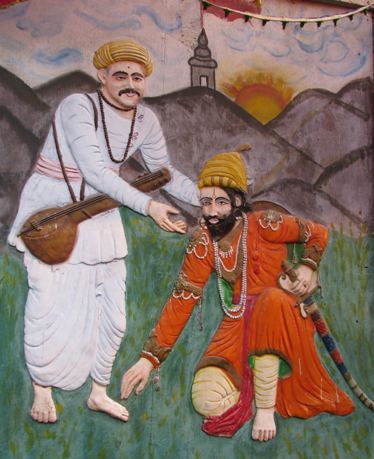| |
|
|
6. Prince Shivaji |
|
|
|
Tukaram’s reputation eventually reached Shivaji (1630-1680). He sent a messenger bearing valuable gifts such as lamps, horses and gems to the saint. Tukaram politely refused the gift and sent a letter containing four of his abhangs to Shivaji. To God, he complained, ‘You seem to provide me exactly the things that do not interest me.’
|
 |
|
Shivaji was astounded by Tukaram’s attitude of renunciation and later, came to Lohgaon to meet the saint himself along with gifts of expensive clothes, jewellery and gold coins. Tukaram said, ‘What use is this treasure to us, we want only Lord Vithoba. Your gesture shows your generosity, but, to us, it is as pebbles. Wealth to us is as undesirable as cow meat.’ Even the most insignificant living being like the ant and an important personage of the land are just the same to us. For us there is no difference between gold and soil, he said. These things would not bring happiness to us, he said, and told Shivaji to recite the name of God and become a servant of Lord Vithoba.
|
|
|
Shivaji was so impressed by this that he gave up his ruler’s functions and devoted himself instead to the discourses of Tukaram. Therefore, the saint reminded him and his soldiers the importance of abiding by their Kshatra (warrior) way of life. ‘We should preach to the world, but you should abide by the Kshatra way of life. In case of a skirmish, the soldiers should go forward and protect ruler on the battlefield,’ he said.
Tukaram offered his blessing to Shivaji and saw him off. Later, Shivaji and his soldiers embraced the saint’s counsel, translated it into practice and became a great force to reckon with.
The mentor (guru) has a special place in the path of knowledge (jnan marga), not so in the path of devotion (bhakti marga). This was Tukaram’s philosophy. He was very much opposed to the advaita (oneness) theory. ‘I just do not allow the language of advaita to come to my ears.’ He was for that divine manifestation that had a form and a figure. Therefore, Tukaram never went in search of a guru.
Once Tukaram had a dream - he was going to the River Indrayani for a bath and coming across a Brahmin on the way paid his respects to the latter. Pleased with this gesture, the Brahmin put his hand on Tukaram’s head and offered him the chant (mantra) of ‘Ramakrishna Hari’ and explained to him the tradition. This happened on a Thursday of Magh ((tenth month of the Hindu lunar calendar) shudh Dashmi (the tenth day of the bright/waxing moon). However, Tukaram himself never asked anyone for a mantra. |
|
|
|
7. The Teachings of Tukaram |
|
|
|
Contents |
|
|
|
|
|